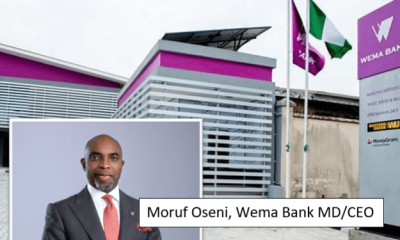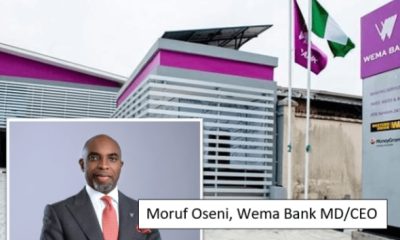Business
Wema Bank’s Rights Issue and Share Price Rally: Rewarding Investor Confidence

Wema Bank’s Rights Issue and Share Price Rally: Rewarding Investor Confidence
In December 2023, Wema Bank started a substantial rights issue, offering 8,572,103,573 ordinary shares at N4.66 per share, based on a two-for-three ratio for existing shareholders as of September 28, 2023.
The surge in Wema Bank’s share prices following the rights issue in December suggests a boost in investor confidence.
This positive sentiment is likely fueled by expectations surrounding the promised utilization of proceeds, the bank’s past performance, and optimistic outlook.
Back story
On September 28, 2023, the closing share price stood at N4.85. The rights issue, priced at N4.66 per share, presented a discount of N0.19 per share or 3.92%.
By the close of trading on December 29, 2023, the share price had increased to N5.60, marking an increase of N0.94 per share or 20.17%.
The upward trajectory continued, with the share price reaching N12 by the close of trading on Friday, January 19, 2024, marking the highest level since 2018.
This outstanding performance resulted in a year-to-date gain of 114%, surpassing the 2023 full-year year-to-date gain of 43.59%.
Generally, while short-term gains are promising, which may be attributed in part to a shift towards specific asset classes with relatively better returns, such as investors flocking to equity assets to counter negative real return, a critical analysis of the bank’s sustainability and its ability to uphold and extend this positive momentum becomes imperative.
More insights
The sustainability of this momentum can be tied to how effectively the bank deploys the proceeds from the rights issue.
The bank had explicitly stated in the rights issue circular its intention to allocate 89.82% of the proceeds from the rights issue towards expanding its loan portfolio, specifically targeting the retail, commercial, and SME sectors.
The bank should adhere to this commitment and execute the planned deployment to realize the anticipated benefits and uphold investor confidence.
One anticipated key impact of the rights issue deployment is the enhancement of Wema Bank’s relatively small franchise within the banking sector.
Currently, the bank’s total assets constitute only 2% of both the banking system assets and loans and advances to customers as at the end of Q3 2023.
More so, the bank’s profitability is observed to be below that of its peers. This is evident in its 9M 2023 reported pre-tax profit of N22.117 billion, accounting for approximately 1% of the listed banks’ pre-tax profit for the first nine months of 2023.
The anticipated expansion in the bank’s loan portfolio is expected to have a positive impact on its financial metrics, particularly on net interest income and net interest margin.
The decline in net interest margin by 8.82% year-on-year to 6.2% in the 9M of 2023 highlights the current challenge.
Furthermore, a sincere deployment of the rights issue proceeds is expected to strengthen the bank’s balance sheet, enhance shareholders’ fund and have a positive effect on the bank’s regulatory capital ratios.
In alignment with this perspective, Fitch Ratings, in its June 2023 report, explicitly affirmed that the rights issue, when completed, would exert a significant positive impact on the bank’s regulatory capital ratios.
Since the landmark 2005 bank recapitalization in Nigeria, which raised the minimum paid-up capital from N2 billion to N25 billion, the landscape of Nigerian banks has evolved significantly.
As of the end of the third quarter in 2023, none of the banks listed on the Nigeria Exchange Limited (NGX) had attained the N25 billion share capital threshold, despite boasting substantial shareholders’ funds.
Among them, FBNH led with a share capital of N17.948 billion, followed closely by Access Holding Company at N17.773 billion.
In this context, Wema Bank’s current share capital of N6.429 billion and shareholders’ fund of N118.558 billion would potentially increase to about N46 billion and N159 billion, respectively, with fully realized proceeds.
This improvement in Tier-1 capital would boost the capital adequacy ratio, currently at 13.31%.
However, there are notable downside risks that demand the bank’s close attention.
The persistent volatility in the exchange rate poses a significant challenge, as it has the potential to erode both the real and dollar values of the capital requirements.
What you should know
The expansion in the loan portfolio resulting from the rights issue, particularly in an elevated risk environment characterized by Naira devaluation, high inflation, and interest rates, may lead to increased loan impairment losses and a rise in the cost of funds.
The bank’s cost of funds has already increased by 17% YoY to 5.4%, primarily attributed to a hike in the Monetary Policy Rate (MPR).
Albeit the overarching goal remains investor returns and increased shareholders’ value. While an initial dip in return on average equity is possible due to increased share outstanding without commensurate growth in earnings, it is expected that the bank will improve its earnings, starting with a critical examination of its cost structure.
The bank’s cost-to-income ratio, although showing a 13% reduction to 71.11% in 9M 2023, remains relatively high compared to industry standards, standing as one of the highest in the banking sector.
The bank’s share price presents an attractive investment opportunity, offering a favorable return with an impressive industry-wise dividend yield of 5.36% and an inflation-protected earning yield of 31.50%.
Additionally, the stock appears relatively undervalued, evident in its relatively low trailing earnings multiple of 3.17x.
Given the heightened investor confidence, it is necessary for the bank to consider rewarding stakeholders. A sustained focus on cost optimization, effective risk management, and delivering on the promised utilization of funds are imperative.
These measures will not only strengthen investor confidence but also contribute to continuous growth, increased shareholder value, and long-term success.
Business
Access Holdings embarks on N351 billion rights issue to strengthen capital base

Access Holdings embarks on N351 billion rights issue to strengthen capital base
Access Holdings Plc has held a formal signing ceremony as part of the arrangements to raise a total of N351 billion by way of a rights issue to existing shareholders.
The offer is part of the group’s strategy to enhance its working capital requirements, which includes organic growth funding for its banking and non-banking subsidiaries.
Subject to approval by the SEC
According to the group in a statement, subject to the approval of the Securities and Exchange Commission (SEC), the acceptance and application lists for the rights issue are expected to open on Monday, July 8, 2024, and close on Thursday, August 8, 2024.
Access Holdings’ shareholders had at its 2nd Annual General Meeting (AGM), which was held on Friday, April 19, 2024, backed its plan to execute a Capital Raising Programme of about $1.5 billion as well as the subset initiative to raise capital through a rights issue of ordinary shares to its shareholders.
The Group stated that, under the Rights Issue, 17.772 billion ordinary shares with a nominal value of N0.50 each will be offered at N19.75 per share, on the basis of one new ordinary share for every two existing ordinary shares held as of Friday, June 7, 2024.
2023-2027 strategic plan
At the Signing Ceremony, Acting Managing Director/Chief Executive Officer of Access Holdings Plc, Bolaji Agbede, disclosed that “The Rights Issue is a significant step in delivering our 2023-2027 strategic plan. The additional capital will enable us to maximise emerging opportunities and deliver long-term value to our shareholders.”
Agbede disclosed that Chapel Hill Denham is the Lead Issuing House to the Offer, while Atlas Registrars Limited will serve as Registrars through the exercise.
“The Joint Issuing Houses are Coronation Merchant Bank, Stanbic IBTC Capital, Vetiva Advisory Services, Greenwich Merchant Bank, FCSL, First Ally Capital, FCMB Capital, Renaissance Capital Africa and Meristem Capital,” he said.
Other parties to the Offer according to him are Coronation Merchant Bank, Coronation Securities, Chapel Hill Denham Securities Limited, FSDH Capital, Cordros Capital, Cowry Securities, First Integrated Capital Management Ltd, Network Capital Ltd, CSL Stockbrokers Limited, Compass Investment & Securities Ltd, PAC Securities Limited, Dynamic Portfolio, Chartwell Securities Limited, Tiddo Securities Limited, and Futureview Securities Limited.
He noted that the Rights Circular for the Issue, which contains a Provisional Allotment Letter and the Participation Form, will be mailed directly to shareholders of the Group. Printed copies of the Participation Form can also be obtained at any Access Bank branch and the offices of the Issuing Houses during the Offer Application Period.
“All existing shareholders and prospective investors are encouraged to read the Rights Circular and Prospectus and, where in doubt, consult their Stockbroker, Fund/Portfolio Manager, Accountant, Banker, Solicitor, or any other professional adviser for guidance before subscribing,” he said.
Business
Reasons Investors Might Purchase Fidelity Bank’s Offerings, as Identified by Capital Market Stakeholders

Reasons Investors Might Purchase Fidelity Bank’s Offerings, as Identified by Capital Market Stakeholders
Fidelity Bank Plc started its N127.1 billion combined rights and public offers to a rousing support from the investing public as key capital market stakeholders recalled the symbolic importance of Fidelity Banks impressive growths and investor-friendly disposition over the years.
From the Nigerian Exchange (NGX) to stockbrokers, investors and customers; the N127.1 billion combined rights and public offer received unreserved recommendations, with industry thought leaders citing the performance of Fidelity Bank in its core banking operations and as a quoted company at the stock market.
They said Fidelity Banks N127.1 billion combined rights and public offer was the right way for the nations banking recapitalisation exercise to start as the bank, which has the highest corporate governance rating and an average annual capital gain of more than 100 per cent at the stock market, has strong appeal to the investing public.
Fidelity Bank is offering a rights issue of 3.2 billion ordinary shares of 50 kobo each at N9.25 per share.
The bank is also simultaneously offering 10 billion ordinary shares of 50 kobo each to the general investing public at N9.75 per share.
The acceptance and application lists for the rights issue and public offer, which opened on Thursday, June 20, 2024, are scheduled to close on Monday, July 29, 2024.
The rights issue has been pre-allotted on the basis of one new ordinary share for every 10 existing ordinary shares held as at the close of business on Friday, January 05, 2024.
The Doyen of Stockbrokers, the oldest practicing stockbroker, Alhaji Rasheed Yussuff, said Fidelity Bank has good records going for it with its history of impressive growth and profitability and dividend payments.
According to him, the bank is known to the market as a good investment, with evident records of impressive returns and corporate responsibility.
Yussuff, who was already a leading stockbroker and managing director of Trust Yields Securities Limited in 2004-2005 when Fidelity Bank launched its initial public offering (IPO) and listed its shares at the stock market, said the bank has been hitting all positive records that should encourage investors to buy more into it.
Referencing the banks impressive returns, Yussuff, who has more than five decades in the capital market and was principal dealing clerk for ICON Limited/ICON Stockbrokers in 1976, particularly noted that Fidelity Bank has been paying good dividends.
Chairman, Association of Securities Dealing Houses of Nigeria (ASHON), Mr Sam Onukwue, who recalled the founding days of Fidelity Bank in 1987, said he had watched Fidelity Bank sustained commendable growth trajectory over the years.
He said the bank has shown exceptional growth and resilience, rising from being a private merchant in 1987 to becoming one of the largest, publicly quoted commercial banks in Nigeria. Fidelity Bank is one of the seven Nigerian banks with international banking licences.
Onukwue, who is also managing director of Mega Equities Limited, said Fidelity Banks history of performance underlines the strength of its management, noting that the bank has proven to be able to keep investors trust.
Chairman, Nigerian Exchange (NGX), Mr. Ahonsi Unuigbe said the combined offer marked a pivotal moment for the bank and the financial services sector.
This is a testament to Fidelity Banks unwavering commitment to strengthening its own capital base and ensuring sustainable growth through amazing roles played by all of the professional parties to this transaction,
Unuigbe, an investment banker and former director at Standard Bank, said.
He said the new banking recapitalisation is aimed at bolstering the resilience and stability of the nations financial institutions.
According to him, the ongoing recapitalisation has set robust minimum capital requirements that will ensure Nigerian banks are not only more solvent, but also capable of supporting the growth and development of the economy.
Acting Chief Executive Officer, Nigerian Exchange (NGX), Mr. Jude Chiemeka, commended Fidelity Bank for its performance and willingness to avail the investing public of every relevant information.
He assured that the NGX remains committed to supporting companies like Fidelity Bank in its quests to deepen the capital markets and fostering an environment conducive to sustainable growth and innovation.
Founder, KAM Holding, Dr Kamoru Yusuf, said Fidelity Bank has shown to be an exceptional bank with focus on the development of Nigerian economy and companies.
He said investing in Fidelity Bank will be an investment in the growth of Nigerian economy and companies like KAM Holding, the nations largest wholly indigenous metal and steel production company.
Yusuf, whose group has metamorphosed into a global business conglomerate operating in three countries across two continents, confirmed that KAM Holding has benefited immensely from financial supports from Fidelity Bank.
Yusuf, who was physically present at a session at the NGX to present facts behind the offer to the investing public, underlined the relationship between increased capital for a business-focussed bank like Fidelity Bank and the overall development of the Nigerian economy.
Addressing the investing public at the NGX, Managing Director, Fidelity Bank Plc, Dr Nneka Onyeali-Ikpe, reiterated the commitment of the bank to delivering impressive returns to shareholders and supporting the growth of the Nigerian economy.
She explained that the new capital raising by Fidelity Bank was driven by its proactive business expansion plan having secured shareholders approval to raise new equity funds as early as August 2023.
The Central Bank of Nigeria (CBN)s directive on new minimum capital was released in March 2024.
The offer will increase our capacity to support our customers and their businesses.
In summary, this capital raise will help our customers to grow, their businesses to thrive, and their economy to prosper, Onyeali-Ikpe said.
She assured that with its groundswell of supports from enthusiastic shareholders, customers and stakeholders, the bank is on course to achieving the N500 billion new minimum capital base, which will clearly confirm the bank, beyond any doubt, as one of the biggest banks in Nigeria.
Onyeali-Ikpe noted that being the first bank to launch offer out of the many banks in Nigeria after the CBN directive,
Fidelity Bank has shown again to be a pace-setter.
According to her, Fidelity Bank seeks the CBN recapitalization directive as a significant opportunity for a stronger and more resilient banking industry.
We have embraced the challenge as a catalyst to propel us, towards a long-term vision of becoming a market leader across every product that we offer and segment that we sell, not just in Nigeria, but as an international bank, Onyeali-Ikpe said.
She said the proceeds from the N127.10 billion capital raising exercise would be instrumental in achieving its strategic growth plan.
She highlighted that the funds, firstly, would be deployed to drive, business growth and regional expansion.
We will strategically expand our footprints within and outside Nigeria to serve as a broader customer base and to unlock new market opportunities.
Secondly, we will have what we call technological transformation. We are committed to leveraging proprietary technology to improve operational efficiency and deliver exceptional customer service.
Thirdly, we intend to diversify and grow. By investing in information technology (IT) infrastructure and product distribution channels, we will aim to diversify our earnings base through digitalization and business expansion, Onyeali-Ikpe said.
She said the management recognised the importance of investors and are committed to delivering value to them as well.
Our track record of accelerated growth and consistent dividend payment is a testament to this, Onyeali-Ikpe said.
A recent review had shown that Fidelity Bank outperformed all major market indices for measuring returns at the Nigerian stock market, with the banks average annual return over the past five years twice the average return by the overall market and almost four times of average return in the banking sector.
A review of official trading reports at the Nigerian stock market showed that investors in Fidelity Bank have earned more than 507 per cent in capital gains over the past five years, between May 31, 2019 and May 31, 2024
Fidelity Banks share price rose by 507.14 per cent over the period, representing average annual capital gain of 101.43 per cent.
This significantly exceeds all other major return benchmarks, including the banking sector.
With 507 per cent capital gain in five years and average annual gain of more than 100 per cent, the return analysis implies that investment in Fidelity Bank is more attractive than other class of assets, including fixed-income securities such as government and corporate bonds; real estate investment and mutual funds among others.
These returns underscore Fidelity Banks immense value as a stock for all times, helping investors to hedge against inflation while preserving significant long-term value.
The high divisible nature of shares investment and high free float of Fidelity Bank, which makes the banks shares easily available, underline the bank as a most attractive investment option for all cadres of investors- small, medium and high networth; retail and institutional investors.
The All Share Index (ASI) – the common, value-based index that tracks all share prices at the Nigerian Exchange (NGX), which is widely regarded as Nigerias benchmark for equities market, recorded a five-year return of 219.61 per cent, an average annual return of 43.9 per cent.
Contrary to the significantly above average performance of Fidelity Bank, the NGX Banking Index-which tracks the banking sector, doubled by 120.53 per cent over the five-year period, representing average annual return of 24.11 per cent, more than 77 percentage points below Fidelity Banks average return.
Two other major price indices- the NGX 30 Index and NGX Main Board Index, recorded five-year cumulative return of 185.73 per cent and 265.6 per cent respectively, representing average annual gain of 37.15 per cent and 53.1 per cent respectively.
The NGX 30 Index tracks share prices of the 30 largest companies at the stock market while the NGX Main Board Index represents the largest and most diversified group of listed companies at the stock exchange.
Fidelity Bank is quoted on the main board, like most other major banks and companies at the stock market.
The average annual return of 101.43 per cent underlines that Fidelity Bank provides substantial return for investors, even where such investors had borrowed money at the ruling interest rate and the invested fund was adjusted for impact of inflation rate.
Nigerias inflation rate peaked at a high of 33.69 per cent in April 2024 while the Central Bank of Nigeria (CBN)s Monetary Policy Committee (MPC) recently increased the Monetary Policy Rate (MPR), otherwise known as benchmark interest rate, to 26.25 per cent.
Fidelity Banks share price, which closed May 31, 2019 at N1.68 per share, rose successively to N10.20 per share by the end of May 2024.
The ASI had, during the period, rose from its opening index of 31,069.37 points to close weekend at 99,300.38 points. The NGX Banking Index rose from 361.57 points to 797.37 points.
The NGX 30 Index, which opened the period at 1,286.68 points, closed the period at 3,676.44 points.
The NGX Main Board Index appreciated from 1,267.54 points to close weekend at 4,634.31 points.
Business
GTCO Recognized as Nigeria’s Leading Banking Brand

GTCO Recognized as Nigeria’s Leading Banking Brand
Africa’s leading financial services institution, Guaranty Trust Holding Company Plc (“GTCO” or “the Group”), has added to its impressive haul of accolades as it was recently named Nigeria’s strongest brand and Best Banking Brand in Nigeria by Brand Finance and Global Brands Magazine, respectively.
These awards not only reaffirm GTCO’s position as a leading financial services group but also spotlight the Group’s enduring reputation as a customer-focused brand.
Over the years, GTCO has demonstrated remarkable commitment to shaping the future of financial services in Africa and is renowned for its innovative approach to customer service and stakeholder engagement.
The Group’s brand strength is underpinned by a strong commitment to delivering cutting-edge financial solutions, fostering meaningful customer relationships, and Promoting Enterprise using its proprietary free business platforms.
Commenting on the two awards, the Group Chief Executive Officer of Guaranty Trust Holding Company Plc, Segun Agbaje, said:
“These achievements are a reflection of our unwavering commitment to excellence, innovation, and customer satisfaction, as well as to building a truly international brand from our proudly African roots. We are delighted to receive these recognitions and inspired to continue delivering our promise of enriching lives with every opportunity.”
GTCO is a leading financial services group with banking operations in Nigeria, West Africa, East Africa, and the United Kingdom alongside non-banking verticals in HabariPay, Guaranty Trust Fund Managers, and Guaranty Trust Pension Managers.
Its leadership in the banking industry and efforts at empowering people and communities has earned it many prestigious awards over the years.
The Group’s flagship banking franchise, Guaranty Trust Bank, was named Nigeria’s Best Bank and Best Bank in CSR at the 2023 Euromoney Awards for Excellence, Best Banking Group in Nigeria by World Finance, and Best Bank in Nigeria by Global Finance.
Guaranty Trust Bank is featured in the Top 1000 Banks in the World and Top 100 Banks in Africa rankings by The Banker.
-

 News2 years ago
News2 years agoWhat Led Us To Choose Peter Obi As Our Candidate?-Middlebelt Forum
-

 BREAKING NEWS10 months ago
BREAKING NEWS10 months agoKey Insights for the Upcoming 2023/2024 UEFA Champions League Campaign
-

 Entertainment8 months ago
Entertainment8 months agoTaylor Swift Skips Travis Kelce’s Big Game to Prepare for ‘Eras Tour’
-

 News6 months ago
News6 months agoPaul Agbonze Obazele Addresses Labor Party Leaders in Edo Central Senatorial District
-

 BREAKING NEWS10 months ago
BREAKING NEWS10 months agoVan Gaal Alleges 2022 World Cup Rigged in Favor of Messi and Argentina
-

 BREAKING NEWS11 months ago
BREAKING NEWS11 months agoBayern Munich Engages in Discussions for the Acquisition of David De Gea from Manchester United
-

 News1 year ago
News1 year ago“New King of Serie A,” Tinubu hails Osimhen on winning the Serie A Title
-

 News2 years ago
News2 years agoHappy 62nd Anniversary of Nigeria’s Independence!



















